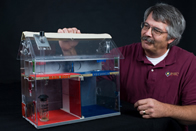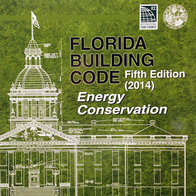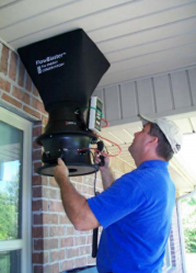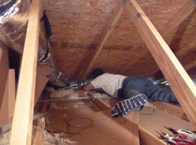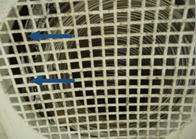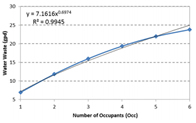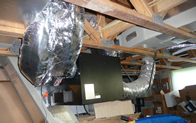|
Congratulations on Retirement, Neil Moyer!
Neil Moyer, who worked at the Florida Solar Energy Center since 1998, retired July 15. Neil is a nationally recognized pioneer in the evolution of building science with a special talent for constructing working model demonstrations of the unseen realm of air flow and pressure impacts. He has helped educate thousands of building scientists through FSEC courses and conference appearances. He has delved into many a building, diagnosing moisture or other indoor air quality problems. Working with our Building America team, he helped improve the construction of manufactured housing. He ran FSEC’s Weatherization Center, training over a hundred agency personnel to conduct the inspections required when the government’s ARRA program increased weatherization funding. Neil has been a frequent speaker and trainer at the Energy & Environmental Building Alliance (EEBA) conference, Affordable Comfort conference, and the national RESNET conference. Good luck on your next adventures, Neil. |
FSEC Software Approved by the Florida Building Commission
At the June Florida Building Commission meeting, FSEC’s EnergyGauge Summit software was approved for Florida energy code compliance for non-residential construction while EnergyGauge USA was approved for residential construction. They are the only programs approved by the FBC for conducting the new energy code that took effect June 30, 2015.
EnergyGauge website
|
Energy Audits for Rural Small Businesses
The U.S. Department of Agriculture (USDA) Rural Energy for America Program (REAP) offers Renewable Energy Systems & Energy Efficiency Improvement Loans & Grants to rural small businesses. USDA chose the University of Central Florida’s FSEC to provide a limited number of subsidized building energy audits to small businesses in rural Florida communities who are eligible for the grants and loans. Audit candidates must also meet FSEC criteria, which will be determined by a phone interview. To be considered for a subsidized energy audit of the building(s) housing your small business in a rural Florida community, please contact Janet McIlvaine through the more information link below.
More Information |
FSEC’s Lixing Gu Receives ASHRAE Distinguished Service Award
ASHRAE’s Distinguished Service Award salutes members of any grade who have served the Society faithfully and with distinction and who have given freely of their time and talent in chapter, regional and Society activities. Congratulations, Lixing!
ASHRAE Awards
|
Energy Educational Kits for K-12 Public Schools
The Florida Department of Agriculture and Consumer Services, Office of Energy is pleased to offer energy educational kits. Schools can apply for kits designed to develop teamwork and problem-solving abilities, investigate environmental issues, and gain hands-on science, technology, engineering and mathematics (STEM) skills. There are two types available: 1)
The Energy Curricula and Learning Kits complement the Solar Matters and Understanding Solar Energy activity units developed by the Florida Solar Energy Center. 2) The Junior Solar Sprint (JSS) Solar Car Kits contain materials for students to design and build solar-powered cars using hands-on engineering skills and principles of science and math.
Learn More |
FSEC Receives ENERGY STAR Award
Florida Solar Energy Center (FSEC) has earned an ENERGY STAR Certified Homes Market Leader Award in recognition of its continued commitment to providing our nation’s homebuyers with ENERGY STAR certified homes. This award recognizes FSEC’s work in promoting energy efficient construction and helping homebuyers experience the peace of mind, quality, comfort, and value that come with living in an ENERGY STAR certified home. In 2014, FSEC contributed 4,119 ENERGY STAR certified homes.
About ENERGY STAR |
|
Investigation of the Effectiveness and Failure Rates of Whole-house Mechanical Ventilation Systems in Florida
This report presents the results of a field investigation of the effectiveness and failure rates of whole-house mechanical ventilation systems installed in Florida homes. The report includes homeowner survey and ventilation system testing results and code modification recommendations. Only three of 21 houses (14.3%) were found to have ventilation air flow close to the design level with the type of ventilation system specified. Two of these were turned off by the homeowner, so only 1 out of the 21 homes (4.8%) were actually delivering the expected ventilation as found. Only 12 of the 21 houses (57.1%) were found to be capable of operating. Nine(43%) of 21 mechanical ventilation systems are not operational for various reasons, including two of the systems having been disconnected.
Publication |
Florida Multifamily Efficiency Opportunities Study
Fifty stakeholders provided input to a study of opportunities to improve the energy and water efficiency of Florida's multifamily buildings. The study was commissioned in October 2014 by the Florida Department of Agriculture and Consumer Services Office of Energy and was conducted by researchers from the University of Florida’s Public Utilities Research Center and Program for Resource Efficient Communities and the University of Central Florida’s Florida Solar Energy Center. The final report provides estimates of energy and water savings that could be achieved from improvements to multifamily rental housing in Florida. The report also identifies policy options and programs that Florida may consider adopting and implementing to encourage landlords to make needed improvements.
Publication |
Estimating Daily Domestic Hot-Water Use in North American Homes
Water heating in the U.S. is a major component of total
energy consumption in buildings, accounting for approximately
18% of total consumption in the residential sector (EIA 2010). While there are many factors influencing hot-water energy use, the actual volume of daily water to be heated is a fundamental quantity for any reasonable estimate of hot-water energy use. This study uses measured annual hot-water use in various North American climates to evaluate hot-water use in homes.
Publication |
Developing Exhaust Air Energy Recovery Credits for the Florida Energy Code
Energy recovery ventilator (ERV) or Heat recovery ventilator (HRV) devices recover energy from building's exhaust air to precondition outdoor air. Energy savings of ERV/HRV devices were determined for various commercial builings in Florida climate using whole building energy simulation tool. The annual HVAC energy percent savings due to ERV/HRV device were calculated from HVAC energy use of a standard reference building without and with ERV/HRV device using EnergyPlus. The annual HVAC energy savings potential (ERV Credits) will be used for code compliance calculation when a compliance softwware does not have ERV modeling capability. The ERV/ HRV credits were reported by building type and climate zone.
Publication |
|
| Get the updates and training you need. Sign up by July 31 for a $50 discount (use discount code “Newcode”) on the following courses: |
Florida Residential Energy Code Compliance: Methods, Tools, and Verification
Whether you're building or renovating residences, you should be familiar with the Florida Residential Energy Code. This course will introduce the code and help you and become skilled with the tools for compliance. Offered Aug 5 and Oct 30.
Register
|
Florida Commercial Energy Code Compliance: Methods, Tools, and Verification
Obtain a working knowledge of the Florida Commercial Energy Code and introduce yourself to EnergyGauge Summit by running energy use simulations and reviewing code compliance reports. Offered Aug 4 and Oct 29.
Register |
Residential Building Air Leakage (Blower Door) Testing
Learn how to perform residential building air leakage tests using a blower door in compliance with 2014 Florida Residential Energy Code. Offered Aug. 27, Sept. 17, Oct. 12, Nov. 9 and Dec. 21.
Register |

